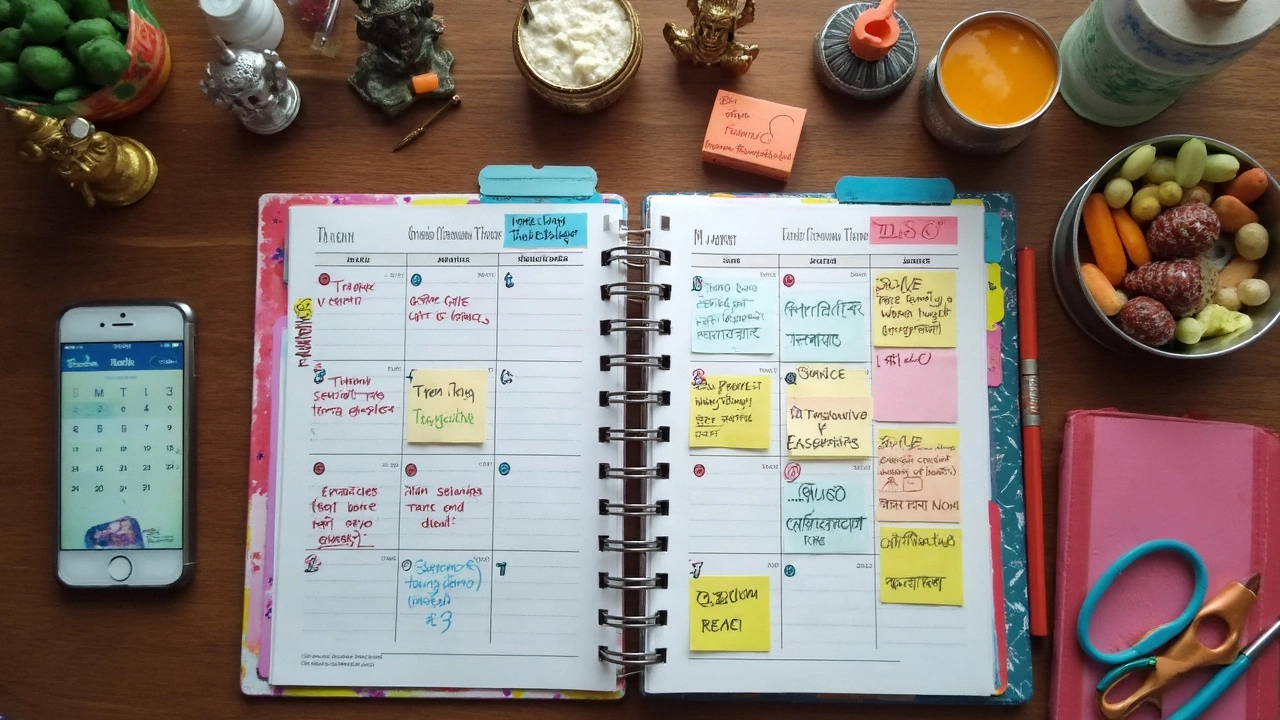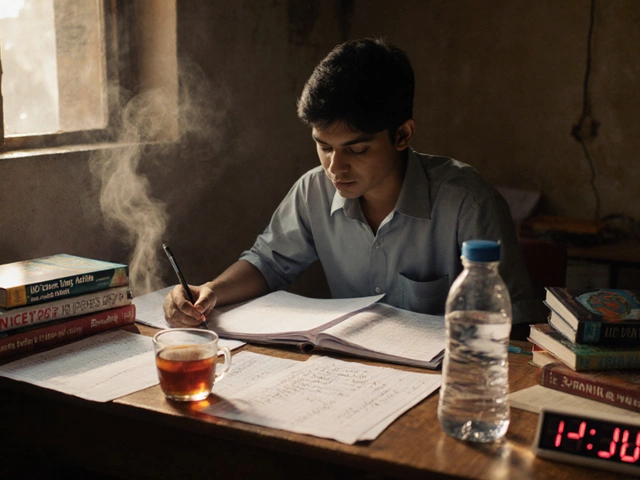Straight up—getting ready for IIT JEE feels like standing at the base of a giant mountain if you don’t know where to put your first step. Most students waste weeks just worrying about how tough it is and what books to buy. Here’s the truth: planning well saves more time than studying randomly or chasing every new coaching trend.
Before you even touch a textbook, clear out one thing—JEE isn’t just about speed-learning tons of stuff. It’s about solving problems quickly and actually understanding concepts, not cramming facts. Clarity matters way more than covering topics at lightning speed.
If you’re starting from scratch, don’t print out a schedule with hourly slots. The first real step? Figure out where you actually stand in Math, Physics, and Chemistry. Take a few basic quizzes or just try solving last year’s easy questions. You’ll see right away where you struggle most. That’s your launch pad, not someone else’s routine.
- Facing the Reality: What JEE Actually Demands
- Setting Up Your Daily Game Plan
- Choosing Books and Resources That Actually Help
- Staying Consistent—Even When It Sucks
- Common Mistakes Beginners Make (And How to Dodge Them)
Facing the Reality: What JEE Actually Demands
It’s easy to underestimate what the IIT JEE preparation journey really takes. This exam isn’t about who can memorize the most, but about who can grasp tough concepts and apply them under pressure. To give you some context, in 2024, over 11 lakh students appeared for JEE Main, but only about 2.5 lakh made it to the next round. The competition is intense—and it’s not just about working hard, but working smart.
"JEE is a test of your ability to solve problems using logic and concept clarity, not just hard work."
- Nitin Jain, JEE 2009 AIR 1
Here’s what you’re really signing up for:
- Depth Over Breadth: Some chapters feel endless, but the JEE is notorious for picking the trickiest spots in the syllabus. They don’t want textbook parrots—they want clever problem-solvers.
- Time Management: You’ll get 3 hours per paper, and you’ll barely notice the clock ticking. Practicing under real test timing from day one is a must.
- Conceptual Understanding: The questions twist familiar topics into weird, unfamiliar forms. If you only memorize examples, you’ll get stuck.
- Regular Revision: Stuff you learn today has to stick for almost two years. The syllabus is massive, so building a strong revision habit is a game-changer.
- Handling Pressure: Nobody talks about how exhausting this journey can get. Pacing yourself and handling burnouts matters as much as reading theory.
Here’s a quick peek at the numbers to really see how selective it is:
| Year | JEE Main Registrations | JEE Advanced Qualifiers | IIT Seats (Approx) |
|---|---|---|---|
| 2024 | 11,00,000+ | 2,50,000 | 17,000 |
| 2023 | 10,80,000 | 2,50,000 | 16,200 |
So, don’t expect shortcuts or easy hacks. If you’re serious about exam strategy and cracking the JEE, you’ve got to respect the level of this challenge. It’s not about waking up at 5 AM or spending on the fanciest coaching. It’s about understanding what’s really asked of you—and then going after those skills hard.
Setting Up Your Daily Game Plan
Planning out every day isn’t just about looking productive—it’s about building real momentum for your IIT JEE preparation. Most toppers didn’t start with 10-hour marathons. They made their plans realistic and stuck to them. Here’s how you nail your daily routine:
- Set a wake-up time (and actually stick to it): Consistency beats late-night cramming every time. Find a time that works for you—maybe 6:00 AM, maybe 7:00, just make it non-negotiable.
- Break up your day into 2-3 main study blocks: Instead of trying to sit for hours at a stretch, plan for two or three main sessions. Keep each block at 90 minutes to 2 hours. After each, take a proper 20-30 minute break—seriously, no guilt.
- Plan for all three subjects daily: Even if it’s just 40 minutes for the weaker subject, keep it in rotation. Ignoring one ruins your JEE exam strategy down the line.
- Set one clear topic goal per block: No “I’ll finish two chapters of chemistry” in one go. Pick, for example, “Atomic Structure problems—level 1 and 2.” Keep it specific and easy to track.
- Every evening, check if you hit each goal: Write down what worked and what didn’t. Adjust your next day—no point copying anyone else’s routine blindly.
Here’s what a starter’s plan might look like if you’re studying six hours a day:
| Time | Activity |
|---|---|
| 7:00 AM - 9:00 AM | Physics (Concept building + basic problems) |
| 10:00 AM - 12:00 PM | Chemistry (NCRT reading + 10 practice problems) |
| 5:00 PM - 7:00 PM | Maths (Previous year questions + doubt review) |
Don’t load up weekend plans with huge catch-up sessions. Use Saturday or Sunday for mock tests or revising hard topics instead. Save a few hours to chill, because burnout is real—and it wrecks consistency faster than any tough chapter.
Want to level up? Track your hours using a simple app or even an old-school notebook. Looking back, you’ll see patterns, not just random effort. That’s where improvement hides.

Choosing Books and Resources That Actually Help
It’s super easy to drown in book recommendations when you’re starting IIT JEE preparation. Walk into any bookstore and you'll see year-wise solved papers, thick theory books, “secret guides”—it’s a maze. The brutal fact? You don’t need a shelf full of material. You just need the right ones, and you need to stick with them.
Let’s be clear about which books really work. NCERT textbooks for Physics, Chemistry, and Math? Absolute foundation. You can’t afford to skip these, especially for Chemistry—almost all Inorganic Chemistry questions are straight from NCERT lines. Next, add a few high-impact picks:
- Maths: Start with R.D. Sharma or R.S. Aggarwal for basics, then go for IIT Mathematics by M.L. Khanna or Cengage Series if you want tough problems.
- Physics: Concepts of Physics by H.C. Verma is gold. If you want practice questions, grab the D.C. Pandey series.
- Chemistry: After you finish every NCERT chapter, try O.P. Tandon for Physical and Inorganic, and Morrison and Boyd for Organic Chemistry.
Don't ignore previous years' question papers. Almost every exam strategy expert says this is the closest thing to real prep. Aim to solve actual JEE papers at least once a month.
Online resources? Use them—but don't spend your whole day watching lectures or making notes from ten different teachers. Stick to top YouTube channels like MathonGo or Physics Wallah for tough topics you can’t crack alone. Don’t keep switching every week; it wastes time and builds zero confidence.
Here’s a quick snapshot of book choices among JEE toppers last year:
| Subject | Top Pick (2024) | % of Toppers Using |
|---|---|---|
| Physics | H.C. Verma | 92% |
| Chemistry | NCERT + O.P. Tandon | 89% |
| Maths | Cengage Series | 76% |
The trick isn’t collecting every book on the planet. It’s about actually finishing the ones you commit to. The more you switch, the more you end up revising nothing. Simple, but true.
Staying Consistent—Even When It Sucks
No sugarcoating here—preparing for the IIT JEE will get annoying, boring, and sometimes downright frustrating. But those who keep going, even when it's not fun, end up ranking higher, plain and simple. A 2023 survey by Resonance Eduventures showed that over 60% of top JEE rankers credited their steady daily routine more than any special coaching. That’s not some fancy hack, it’s just basic consistency.
Let’s get real—motivation won’t be there every day. Don’t rely on it. Rely on a basic routine that you can stick to, even if you’re in a bad mood or feel lazy. Here are some tips to help you stay on track:
- Mix subjects: Rotating between Physics, Chemistry, and Math each day stops burnout. It also helps your brain make connections across topics.
- Mark micro-goals: Don’t just say, 'I’ll study three hours.' Pin down exactly what you’ll finish—like 20 problems from a chapter or one revision module.
- Use a “bare minimum” rule: On rough days, tell yourself you’ll just do 15–20 minutes of revision or a few practice questions. Most times, once you start, you’ll keep going.
- Track your streaks: Apps or even paper trackers help. Seeing a chain of study days builds momentum you don't want to break.
- Don’t ignore breaks: Actual rest—no phone scrolling—refreshes your mind. 10-min power naps or stretching between subjects helps keep you focused longer.
Here’s a quick look at how much time you actually need to put in, going by what toppers shared over the last couple of years:
| Student Category | Average Daily Study Hours | Weeks Off per Year |
|---|---|---|
| Top 100 Rankers | 6–8 hours | 2–4 |
| Within 5000 Rank | 4–6 hours | 4–7 |
| Regular Aspirants | 3–5 hours | 5–8 |
Notice most don’t study 12 hours a day or skip breaks for months. It’s about showing up daily, not burning out in week one. You can miss a day or two each month—just don’t disappear for a week hoping you’ll catch up later. The catch-up game almost never works.
The real difference? Exam strategy isn’t magic. Showing up every day is—especially when you don’t want to. That’s what puts you ahead of the crowd.

Common Mistakes Beginners Make (And How to Dodge Them)
It’s wild how often beginners step into the same traps during their IIT JEE preparation. If you spot these early, you’ll save yourself a lot of headaches—and probably boost your rank too.
- Chasing too many books: Grabbing every popular guide just because everyone else has it? Big waste of cash and energy. Focus on quality over quantity. Experts suggest the NCERTs for Chemistry, H.C. Verma for Physics basics, and one or two trusted resources for each subject.
- Ignoring basics: People think JEE is all about tough advanced stuff and skip the simple concepts. But, nearly 60% of questions need solid basics to even start. Try to master 11th standard chapters before you even peek at shortcuts.
- Leaving too much for "later": Procrastination is a killer. Don’t keep postponing “boring” chapters. Split them into 10-minute chunks so they don’t pile up and stress you out before the exam season.
- No practice with mock tests: Jumping straight to the books and ignoring practice papers? You’ll end up shocked during the real thing. Stats from 2023 showed that toppers solve at least 20 full-length mock papers before the actual exam. That’s where you learn speed and spot silly mistakes.
- Poor time management: Spending three hours on one subject and ignoring the rest? Keep it balanced. A simple calendar or phone app can keep you on track.
- Ignoring health: It’s not all about studying. Junk food, zero exercise, and bad sleep mess with focus. Even a 20-minute walk can sharpen up your mind during tough prep days.
Here's a quick breakdown of some stats from recent JEE toppers, just for perspective:
| Mistake | % of Toppers Avoiding It |
|---|---|
| Ignoring Mocks | 95% |
| Using Too Many Books | 89% |
| Poor Basics | 92% |
| Lack of Sleep | 80% |
If you spot yourself doing any of this, make a change today. The earlier you fix these habits, the smoother your JEE beginner guide journey gets.


